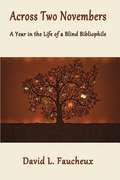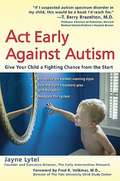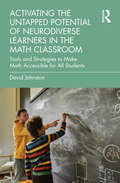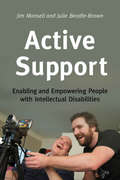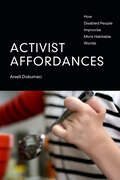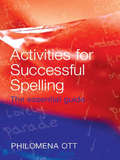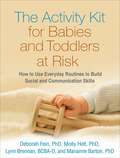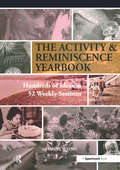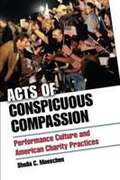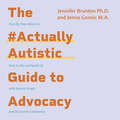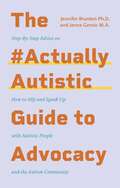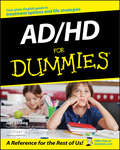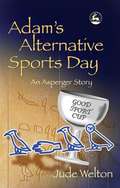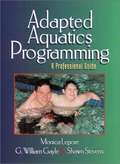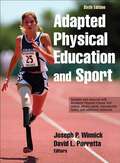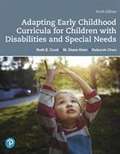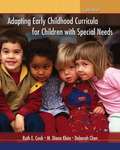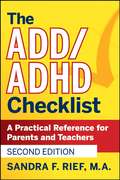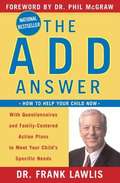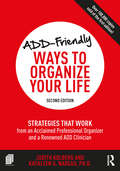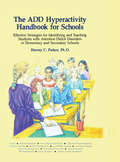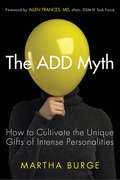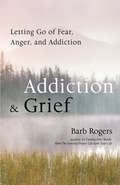- Table View
- List View
Across Two Novembers: A Year in the Life of a Blind Bibliophile
by David Faucheux<P>Friends and family. Restaurants and recipes. Hobbies and history. TV programs the author loved when he could still see and music he enjoys. The schools he attended and the two degrees he attained. The career that eluded him and the physical problems that challenge him. And books, books, books: over 230 of them quoted from or reviewed. All in all, an astonishing work of erudition and remembrance.
Act Early Against Autism
by Jayne LytelJayne Lytel was a successful syndicated columnist when her son Leo was diagnosed with autism. Using her reporting skills to better understand her son's health issues, she helped Leo gain essential abilities. After four years of therapy, he no longer meets the diagnostic criteria for autism, attends a mainstream school, and is a thriving, healthy child. Act Early Against Autismis a practical and empowering guide for parents on how early intervention can change their child's future. Includes information on: - How to recognize early symptoms - Financial challenges - Alternative treatments - Devising and revising therapies
Activating the Untapped Potential of Neurodiverse Learners in the Math Classroom: Tools and Strategies to Make Math Accessible for All Students
by David JohnstonAll students deserve access to a rich and meaningful math curriculum. This book guides middle and high school teachers toward providing all learners – including neurodiverse students – with the support necessary to engage in rewarding math content. Students who receive special education services often experience a limited curriculum through practices that create long-term disadvantages and increase gaps in learning. The tools and strategies in this book help teachers better understand their students to move them closer to their potential. Chapters include differentiation, assessment, classroom structure, and learning targets. Both general education math teachers who have not been trained in special education support and special education teachers with a limited background in standards-based math pedagogy will learn new skills to improve their teaching from this practical resource.
Active Citizenship and Disability
by Andrew Power Janet E. Lord Allison S. DeFranco Andrew Power Janet E. Lord Allison S. DefrancoThis book provides an international comparative study of the implementation of disability rights law and policy focused on the emerging principles of self-determination and personalisation. It explores how these principles have been enshrined in the United Nations Convention on the Rights of Persons with Disabilities and how different jurisdictions have implemented them to enable meaningful engagement and participation by persons with disabilities in society. The philosophy of 'active citizenship' underpinning the Convention - that all citizens should (be able to) actively participate in the community - provides the core focal point of this book, which grounds its analysis in exploring how this goal has been imagined and implemented across a range of countries. The case studies examine how different jurisdictions have reformed disability law and policy and reconfigured how support is administered and funded to ensure maximum choice and independence is accorded to people with disabilities.
Active Support
by Julie Beadle-Brown Jim MansellActive Support is a proven model of care that enables and empowers people with intellectual disabilities to participate fully in all aspects of their lives. This evidence-based approach is particularly effective for working with people with more severe disabilities, and is of growing interest to those responsible for providing support and services. The authors provide a comprehensive overview of Active Support and how it can be used in practice, based on the theory and research underpinning the methods involved. They describe how to engage people with intellectual disabilities in meaningful activity as active participants, and look at the communication style needed to foster positive relationships between carers and the people they are supporting. Highlighting the main issues for those trying to put Active Support into practice, they explain what is needed on a day-to-day basis to support the implementation, improvement and maintenance of the approach, along with possible solutions for the difficulties they may encounter. Finally, they look at how to integrate Active Support with other person-centred approaches, drawing on examples from various organisations and individual case studies. The definitive text on Active Support, this book will be essential reading for anyone professionally concerned with the quality of life of people with intellectual disabilities, including psychologists, behaviour specialists, social workers, care managers, occupational therapists and inspectors and regulators of services, as well as families.
Activist Affordances: How Disabled People Improvise More Habitable Worlds
by Arseli DokumaciFor people who are living with disability, including various forms of chronic diseases and chronic pain, daily tasks like lifting a glass of water or taking off clothes can be difficult if not impossible. In Activist Affordances, Arseli Dokumacı draws on ethnographic work with differently disabled people whose ingenuity, labor, and artfulness allow them to achieve these seemingly simple tasks. Dokumacı shows how they use improvisation to imagine and bring into being more habitable worlds through the smallest of actions and the most fleeting of movements---what she calls “activist affordances.” Even as an environment shrinks to a set of constraints rather than opportunities, the improvisatory space of performance opens up to allow disabled people to imagine that same environment otherwise. Dokumacı shows how disabled people’s activist affordances present the potential for a more liveable and accessible world for all of us.
Activities for Successful Spelling: The Essential Guide
by Philomena OttThis highly practical activity workbook is linked to the core text How to Manage Spelling Successfully and has been designed to support dyslexic students practise the spelling strategies and methods recommended in that book. This activity book can be used separately, or as part of an integrated programme for building students' spelling skills at home or at school. Suitable for mainstream classrooms, pupils undertaking additional literacy support in small groups, and for one-to-one teaching of individuals with specific learning difficulties including dyslexia, this excellent resource contains activities suitable for use at different stages of development, and for use with adults as well as school students. Each section contains a range of multi-sensory activities, including word searches, simple crossword puzzles and dictation exercises. This is an essential classroom companion for anyone helping struggling spellers.
The Activity Kit for Babies and Toddlers at Risk
by Molly Helt Deborah Fein Lynn Brennan Marianne BartonSuspecting that your baby or toddler may have autism spectrum disorder or another developmental delay can be scary and overwhelming. But there is a lot you can do to help, even while waiting for an evaluation or early intervention. With the right tools, everyday tasks can be terrific opportunities for building critical social and communication skills. Start at the kitchen table, bathtub, or shopping cart! In this easy-to-navigate guide, leading experts present more than 100 games and activities designed to support development in children from birth to age 3. Your child's daily routines are transformed into learning opportunities that promote crucial abilities, like how to imitate others or use simple hand gestures to convey wants and needs. As a parent, you are the most important person in your child's life. Now you can be the best teacher, too.
Activity & Reminiscence Handbook: Hundreds of Ideas in 52 Weekly Sessions
by Danny WalshThis comprehensive guide provides a bumper book of original resource material for reminiscence and activities with older people for a whole year! Containing 52 sections of ideas and resource materials for each week of the year, this is an invaluable resource for activity organisers and group leaders in residential, day care and hospitals, and for anyone working with older people. There is a theme for each week, eg. Animals and pets, with corresponding ideas for social events, reminiscence, exercises and games, quizzes, art and crafts, as well as 'this week in history', good ideas', 'discussion topics', 'homework' and the option to personalise the week by recording local anniversaries and events alongside personal landmarks and details. The ideas are easy to use and are relevant for both groups and individuals, including those with mental health and cognitive problems. Some activities require some physical effort, others mental effort, but they are all adaptable to be fun and achievable. This book also includes an introduction to the nature and value of reminiscence and activities, and guidelines on 'how to do it'. Written by the author of "Groupwork Activities", this comprehensive resource provides hundreds of activity and reminiscence ideas - a fantastic resource.
Acts of Conspicuous Compassion: Performance Culture and American Charity Practices
by Moeschen Sheila C."Acts of Conspicuous Compassion" investigates the relationship between performance culture and the cultivation of charitable sentiment in America, exploring the distinctive practices that have evolved to make the plea for charity legible and compelling. From the work of 19th-century melodramas to the televised drama of transformation and redemption in reality TV s "Extreme Makeover: Home Edition," "Acts of Conspicuous Compassion" charts the sophisticated strategies employed by various charity movements responsible for making organized benevolence alluring, exciting, and seemingly uncomplicated. Sheila C. Moeschen brokers a new way of accounting for the legacy and involvement of disabled people within charity specifically, the articulation of performance culture as a vital theoretical framework for discussing issues of embodiment and identity dislodges previously held notions of the disabled existing as passive, objects of pity. This work gives rise to a more complicated and nuanced discussion of the participation of the disabled community in the charity industry, of the opportunities afforded by performance culture for disabled people to act as critical agents of charity, and of the new ethical and political issues that arise from employing performance methodology in a culture with increased appetites for voyeurism, display, and complex spectacle. "
The #ActuallyAutistic Guide to Advocacy: Step-by-Step Advice on How to Ally and Speak Up with Autistic People and the Autism Community
by Jenna Gensic Jennifer BruntonThe #ActuallyAutistic Guide to Advocacy takes an in-depth look at the key elements of effective, respectful, inclusive advocacy and allyship. Every topic was chosen, shaped, and informed by #ActuallyAutistic perspectives.The step-by-step guide discusses various aspects of how autism is perceived, explores how best to speak up for individual needs, and introduces advocacy for the wider autistic community. Each step outlines one vital aspect of advocacy and allyship, such as emphasizing acceptance, avoiding assumptions and assuming competence. The advice and strategies laid out in this guide center the wisdom and experiences of Autistic people and enable the listener to confidently speak up with insight and understanding.(P) 2022 Jessica Kinglsey Publishers
The #ActuallyAutistic Guide to Advocacy: Step-by-Step Advice on How to Ally and Speak Up with Autistic People and the Autism Community
by Jenna Gensic Jennifer BruntonThe #ActuallyAutistic Guide to Advocacy takes an in-depth look at the key elements of effective, respectful, inclusive advocacy and allyship. Every topic was chosen, shaped, and informed by #ActuallyAutistic perspectives. The step-by-step guide discusses various aspects of how autism is perceived, explores how best to speak up for individual needs, and introduces advocacy for the wider autistic community. Each step outlines one vital aspect of advocacy and allyship, such as emphasizing acceptance, avoiding assumptions and assuming competence. The advice and strategies laid out in this guide center the wisdom and experiences of Autistic people and enable the reader to confidently speak up with insight and understanding.
AD / HD For Dummies
by Jeff Strong Michael O. FlanaganSound advice for parents whose kids have trouble concentrating According to the National Institutes of Health, an estimated five to ten percent of children suffer from Attention Deficit Disorder (ADD) or Attention Deficit Hyperactivity Disorder (ADHD). This book provides answers for parents of children who may have either condition, as well as for adult sufferers. Written in a friendly, easy-to-understand style, it helps people recognize and understand ADD and ADHD symptoms and offers an authoritative, balanced overview of both drug and non-drug therapies.
Adam's Alternative Sports Day: An Asperger Story
by Jude Welton'This is a very useful book for any staff involved in teaching students on the autism spectrum. Its strength is its easy-to-read structure and the engaging illustrations, lists and notes. It meets the needs of many students and adults who find it hard to understand and cope with competition and unstructured events. I can strongly recommend this book to pupils between the ages of 6 and 13 years. It is a good idea for teachers or parents to read it to children and allow them to participate in the activities. It is also a good read for children who do not have Asperger's syndrome as it will help to develop their awareness.' - Good Autism Practice Nine-year-old Adam dreads Sports Day - he usually comes last in the races and never gets chosen for the team events. So he is delighted when Mr Williams, the head teacher, announces that this year there will be an Alternative Sports Day with some very different challenges. There will be quizzes, riddles to solve, and a treasure hunt - all the things that Adam enjoys. At last he'll have a chance of winning something. But as the competition runs high, how will Adam feel if his best friend Josie beats him to the Challenge Cup? And what will they do when they discover that James, the new boy in the class, is cheating? A fun and absorbing children's story, Adam's Alternative Sports Day also offers insights into how a child with Asperger Syndrome copes with the ups and downs and everyday challenges of school.
Adapted Aquatics Programming: A Professional Guide
by Monica Lepore G. William Gayle Shawn StevensThis text for aquatics instructors covers the various philosophies and issues relating to adapted aquatics programs; offers detailed information on skills and resources for adapted aquatics personnel; and discusses program enhancement, including model programs and how to modify fitness activities for participants with disabilities. Annotation c. Book News, Inc. , Portland, OR (booknews. com)
Adapted Physical Education And Sport
by Joseph P. Winnick David L. PorrettaThe field of adapted physical education and sport has undergone numerous changes in recent years. This new edition of Adapted Physical Education and Sport will help you stay on top of those changes and, in doing so, provide the highest-quality physical education and sport opportunities for students with disabilities.
Adapting Early Childhood Curricula For Children With Special Needs
by Ruth Cook M. Klein Deborah ChenAdapting Early Childhood Curricula for Children with Disabilities and Special Needs uses a developmental focus, rather than a disability orientation, to discuss typical and atypical child development and curricular adaptations. The integrated, non-categorical approach assumes that children are more alike than different in their development. The inclusive focus assumes that attitudes, environments, and intervention strategies can be adapted so that all young children with disabilities or other special needs can be included. <p><p> An essential text for today, and a valuable resource to take into the classroom tomorrow, this practical guide provides daily activities, evidence-based how-to strategies, and realistic lesson modifications that help facilitate truly inclusive classrooms. Aspiring educators will also learn to develop their collaboration and problem-solving skills to effectively work with families, colleagues, and paraprofessionals in supporting every child's positive development. <p> The 10th Edition is updated to include enhanced discussions on working with families, children, and professionals of diverse cultural and linguistic backgrounds and lifestyles; new tips for integrating Division for Early Childhood Recommended Practices; updated requirements for writing IEP goals and recommendations; and more.
Adapting Early Childhood Curricula for Children with Special Needs (Eighth Edition)
by Ruth E. Cook M. Diane Klein Deborah ChenThe book focuses on a blend of developmental and learning theories, with practical suggestions for delivery of services to young children with special needs and their families.
The ADD/ADHD Checklist
by Sandra F. RiefThe bestselling guide, fully revised and updated, offering practical information and tips to help every child with ADHD succeedThe ADD/ADHD Checklist helps parents and teachers to better understand children and teenagers with attention problems and provide the kind of support and intervention that is crucial to kids' success. Presented in a concise, easy-to-read checklist format, the book is packed with practical advice and information on a wide range of topics, including what we do and don't know about ADHD, probable causes, critical elements for school success, the most commonly prescribed medications, what children with ADHD need at home, effective behavioral strategies, how to help kids stay organized, and advocating for an ADHD child.
The ADD Answer: How to Help Your Child Now
by Frank LawlisEvery year, 17 million new cases of attention deficit disorder, or ADD, are diagnosed in children. But medications designed to treat the disorder don't work for many children and often leave families frustrated and searching for more options. In The ADD Answer, Dr. Frank Lawlis draws upon his thirty-five years of experience as a clinical and research psychologist to show parents how they can reclaim their central role in healing their children with comprehensive step-by-step advice on dealing with the problems of ADD. His approach blends the latest medical, nutritional, and psychological treatments that can increase brain function with expert insight into the emotional--and spiritual--support kids need. An inspiring and essential guide, The ADD Answer will help every family facing the challenges of ADD create a more loving, healthy environment necessary for their child to thrive.
ADD-Friendly Ways to Organize Your Life: Strategies that Work from an Acclaimed Professional Organizer and a Renowned ADD Clinician
by Kathleen Nadeau Judith KolbergAcclaimed professional organizer Judith Kolberg and Dr. Kathleen Nadeau, renowned ADHD clinical psychologist, are back with an updated edition of their classic text for adults with ADD. Their collaboration offers the best understanding and solutions for adults who want to get and stay organized. Readers will enjoy all new content on organizing digital information, managing distractions, organizing finances, and coping with the "black hole" of the Internet. This exciting new resource offers three levels of strategies and support: self-help, non-professional assistance from family and friends, and professional support; allowing the reader to determine the appropriate level of support.
The ADD Hyperactivity Handbook For Schools
by Harvey C. ParkerIf you've ever wanted to take dynamic and vibrant digital photos of your favorite band in concert, but aren't sure how to tackle such obstacles as approaching the stage, tricky lighting situations, or even what equipment to use, then look no further!Concert and Live Music Photographyis a comprehensive guide to shooting live music performances, providing you with the right information on equipment, camera settings, composition, and post-processing to get the best out of each performance shot. J. Dennis Thomas, whose work has appeared in such magazines as Rolling Stone, SPIN, and Country Weekly, shares tips on lighting, common problems, etiquette, and recommended camera settings for shooting in a variety of different venues, including clubs, bars, outdoor concerts, theatres, stadiums, and arenas. He also explains how to get the right credentials to get you closer to each performance.Jam packed with over160 photos from today's top concerts, this book will not only give you the information you need to start taking rockin' photos of your favorite musicians, but will spark your creativity when you're anticipating the next shot.For the on-the-go photographer, a cool companion website features additional tips, venue troubleshooting, and an equipment checklist when you need to think on your feet while running to another gig.
The ADD Myth: How to Cultivate the Unique Gifts of Intense Personalities
by Martha BurgeAn Alternative Approach to Addressing ADDDespite the millions of people taking medication for attention deficit disorders, there remains no objective method of diagnosis for ADHD. In The ADD Myth, Martha Burge proposes a different understanding and solution for those diagnosed.ADD isn’t what we think it is. Author and ADHD coach Martha Burge introduces a different way of looking at the disorder often associated with boredom and impulsivity in young people. She argues that what is commonly understood as ADHD is actually five intense personality traits: sensual, psychomotor, intellectual, creative, and emotional. Once the supposed ADD symptoms are properly understood for what they are, people with these intense personality traits can develop them into gifts.Finding an alternative solution. After having two sons diagnosed with ADHD, and witnessing their serious reaction to drug treatments, Martha began a search for a different approach and a more natural treatment for ADHD. By looking at all personalities as part of the neurodiversity spectrum, she shows us how we can see where those with “intense” personality traits fit on the spectrum. Once we understand that, we are better able to help people embrace their traits and develop one’s intense nature rather than try to stifle it.This book will change the way you look at ADD for the better—open it up and learn more about:The five intense personality traits and how they apply to individuals diagnosed with ADHDWhy the medical profession should seek alternative explanations for ADHDStories, practical steps, and daily practices for developing one's intense nature with the least amount of sufferingReaders of books such as Driven to Distraction, Healing ADD, Delivered from Distraction, or ADHD: Non-Medication Treatments and Skills for Children and Teens will enjoy The ADD Myth.
Addiction & Grief: Letting Go of Fear, Anger, and Addiction
by Barb RogersEmotional Recovery From AddictionAuthentic recovery is more than an attitude. It is based on emotional work that involves an honest appraisal of one's life. It is through dealing with unresolved feelings of grief and anger that one can truly heal from addiction.The emotional “bottom” of recovery. Just as one needs to hit bottom with drinking or using in order to begin recovery, eventually one will also hit an emotional “bottom” of fear, anger, and grief. And recovery can only start by first understanding how, when, and where those emotions took control. Author Barb Rogers challenges readers in recovery to investigate the unresolved grief and loss in their lives and helps readers navigate the impacts of those emotions—emotions that can lead back to using if not resolved.Finding healing and happiness. Recovery from addictions involves more than getting sober. It involves finding happiness, which can only happen if the emotional work is done as well. Negative emotions have the ability to weigh on us and influence both our decisions and the way we handle life’s challenges. If we continue to live with fear, anger, and grief, we aren’t really free from our addictions. The steps to recovery—authentic and complete recovery—involve healing from the deeper issues in our life. Learn more about:The emotional healing that goes hand-in-hand with addiction recoveryDealing with grief and resolving underlying issuesHow to find happiness after getting soberIf you learned from books like This Naked Mind, Rewired, The Mindfulness Workbook for Addiction, or A Gentle Path Through the Twelve Steps, then you’ll want to read Addiction & Grief.
